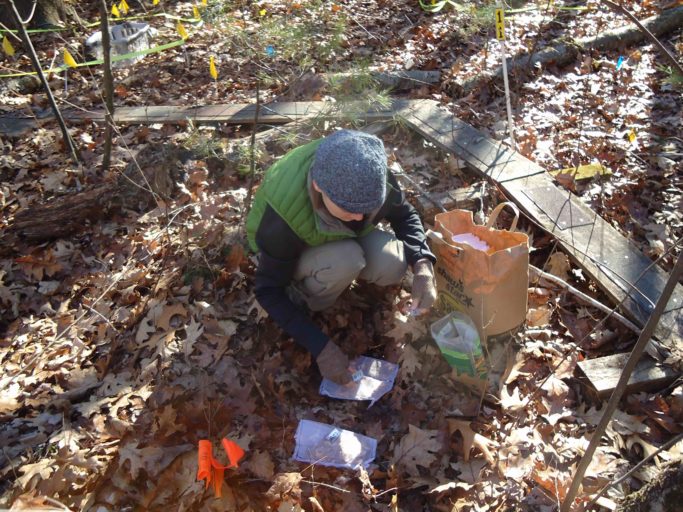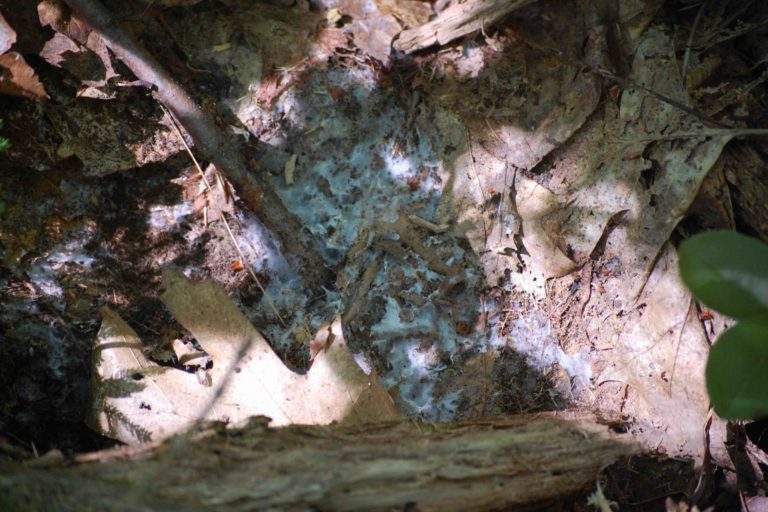- Soil fungi are the primary decomposers in temperate forests.
- Scientists found that fungi species reared in nitrogen polluted soils were able to decompose far less plant material than the same species collected from less polluted soil.
- Even when fungi from polluted areas were grown in un-polluted petri dishes, they still could not decompose as well as fungi collected from cleaner soils.
- Researchers hypothesize that nitrogen pollution could be altering how fungi metabolize nitrogen.
Nitrogen pollution can alter the way temperate forests function, a new study has found.
Excess nitrogen from air pollution slows down decomposition of plant matter by soil fungi, which in turn reduces the amount of nutrients available to plants for their growth, researchers report in the study published in Ecology.
“[Soil fungi] are the recyclers of the ecosystem — the primary decomposers of wood, leaves, and other plant material,” co-author Serita Frey of the University of New Hampshire, Durnham, said in a statement. “Without them, dead material would not be broken down. We would be buried in leaves and wood, and no new nutrients would be made available for plants to use.”

Nitrogen (N) is an important nutrient used by plants and other living beings. But plants can make use of nitrogen only when it is converted to its reactive forms such as ammonia, urea or nitrates — either by nitrogen fixing bacteria or by industrial processes.
Unfortunately, human activities such as burning of fossil fuels and agricultural intensification have increased the amount of reactive nitrogen entering the atmosphere. This rise in nitrogen pollution can increase levels of nitrogen in soil, which in turn can alter the way forest floor communities function.
Since fungi are the primary decomposers in temperate forests, Frey and her colleagues tried to find out the effects of nitrogen pollution on these microbial organisms. The team analyzed two kinds of soil fungi samples — those collected from a long-term study area at the Harvard Forest, where researchers have been adding nitrogen to the soil for the past 28 years to simulate chronic industrial pollution, and those collected from cleaner, un-polluted soils in the forest. The researchers then reared these fungi samples in the lab for 14 weeks.

The team found that the fungi grown in polluted soils had evolved. Overall, these fungi species were able to decompose far less plant material than the same species collected from less polluted soil. Even when fungi from polluted areas were grown in un-polluted petri dishes, they still could not decompose as well as fungi collected from cleaner soils.
“Something about the organism had changed in a fundamental way,” Frey said.
The mechanism for these changes is still unclear, but the researchers hypothesize that nitrogen pollution could be altering how fungi metabolize nitrogen. This in turn could be affecting decomposition, likely through reduced production of the digestive enzymes necessary for efficient decay of lignin and cellulose.
Decomposition is vital to the functioning of a forest ecosystem, and slowing this fundamental process could hamper the growth of plants.
“We know that temperate forests exposed to long-term nitrogen enrichment have accumulations of organic matter because of reduced decay. Our research provides one mechanism by which this is happening,” Frey said. “Although organic matter (or carbon) accumulation is often seen as a positive thing (“carbon sequestration”) the flip side of the coin is that when decay is slowed, nutrient recycling is slowed, meaning that plants have reduced access to the nutrients they need for optimum growth.”
“Human activities are changing how soil organisms behave and function and this has implications for the health of both natural and managed ecosystems,” she added.

Citation:
- van Diepen, L. T. A., Frey, S. D., Landis, E. A., Morrison, E. W. and Pringle, A. (2017), Fungi exposed to chronic nitrogen enrichment are less able to decay leaf litter. Ecology, 98: 5–11. doi:10.1002/ecy.1635
FEEDBACK: Use this form to send a message to the author of this post. If you want to post a public comment, you can do that at the bottom of the page.







